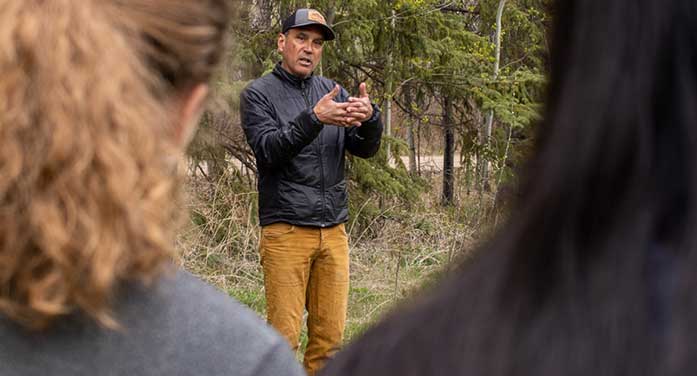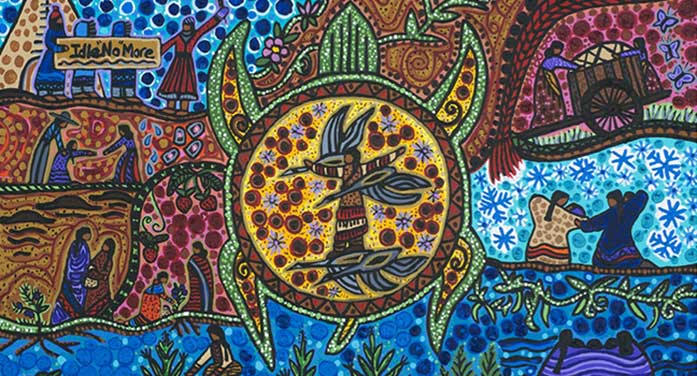
Dwayne leads an educational walking tour in Edmonton’s river valley in which he highlights the history of Indigenous peoples in the region. (Photo: Laura Sou)
There is a wisdom principle known as wâhkôhtowin underpinning how Cree peoples fundamentally see the world. Literally, it means kinship but refers more widely to the interconnectedness of human beings with each other and with all other forms of life.
According to Dwayne Donald – freshly appointed Canada Research Chair in reimagining teacher education with Indigenous wisdom traditions – wâhkôhtowin is a wisdom teaching sorely lacking in Canada’s education system and one that may be necessary for our very survival.
Donald, a professor in the Department of Secondary Education, is one of nine University of Alberta researchers recently named as new Canada Research Chairs.
| RELATED CONTENT |
| Beloved professor leaves a legacy of scholarship and support By Bev Betkowski |
| Website offers global hub for research on decolonization, anti-racism By Adrianna MacPherson |
| Indigenous education can and must be fixed By Ken Coates |
According to Donald, the Age of Enlightenment informing Western colonialism – based on reason, individualism and skepticism – took an unfortunate “epistemological turn” that disregarded the metaphysical qualities of human life, along with the sacred nature of ecological relationships that human beings depend upon for their survival.
That epistemological turn is at least partly responsible for the destructive colonial logic that has wreaked so much havoc among Indigenous peoples, he says, seeing anything beyond the privileged individual as objects to either conquer or exploit.
Indigenous wisdom traditions never made that turn. For the Cree, or nêhiyawak peoples, wâhkôhtowin is profoundly rooted in place: “When we connect with local ecosystems we tap into the wisdom of the wâhkôhtowin imagination,” says Donald.
“We are taught to approach places as living relatives. It has to do with how to live a good life in a way that does the least damage so that all life can continue on.”
In pedagogical terms, it’s not a question of simply removing information from the curriculum no longer considered relevant and replacing it with factual elements of Indigenous knowledge.
“That’s another legacy of colonial logic, when knowledge and knowing (are) taken up mostly in informational ways,” Donald says. “You can’t approach Indigenous knowledge with a PowerPoint presentation because there is no shift in how the information is engaged by the person receiving it.”
“If we really want to make a change, we can’t continue to follow the same educational paradigms. It has to do with relationality. Of course, humans are cognitive beings, but meaningful learning also has to do with the holistic complexities of human perception of the world – physically, emotionally and spiritually.”
Donald came to this revelation relatively late in life. His mixed ancestry includes Beaver Hills Cree, Métis, Norwegian and Scottish. But in his youth growing up in Edmonton, he was exposed to little of his Indigenous heritage.
“I didn’t learn much about it. Times were different then, and I understand that,” he says. “I don’t blame anybody for it.”
After graduating with a BA from the U of A and a BEd from the University of Calgary, he got his first job as a social studies teacher at Kainai Nation, a Blackfoot community in southern Alberta.
“My Blackfoot friends took pity on me over 10 years and taught me about their land and shared their stories, and I got to participate in ceremonies. Those experiences changed my life,” he says.
For the past two decades, starting with his doctoral work in 2003, that shift in perspective has informed everything he does.
“It has been my goal to connect with the wisdom and the gifts that exist in the place that I’m from, amiskwaciy, and let that guide me in my role as an educator,” he says.
In his role as CRC, he plans to introduce locally rooted concepts of Indigenous wisdom to teachers in four communities across Canada. The project will be aimed at “unlearning colonialism and the educational legacies of relationship denial,” Donald says.
“I want to ask teachers to help me puzzle on this issue, and reflect upon their own experiences with it as students and as educators, and experiment with how we can proceed differently.”
| By Geoff McMaster
Geoff is a reporter with the University of Alberta’s Folio online magazine. The University of Alberta is a Troy Media Editorial Content Provider Partner.
The opinions expressed by our columnists and contributors are theirs alone and do not inherently or expressly reflect the views of our publication.
© Troy Media
Troy Media is an editorial content provider to media outlets and its own hosted community news outlets across Canada.

